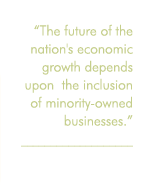


 Economic Power and the "Sleeping Giant" But a quarter century later, he says the political power blacks have amassed in city, county and state government hasn't translated into more economic power for blacks and other minorities here - with a few notable exceptions (hint: Donald Watkins) - as it has in Atlanta. Davis notes that Black Enterprise magazine recently ranked Birmingham 7 th in its 10 top places for blacks to live. Yet it was the lowest among the 10 in terms of business opportunities for blacks. He says growing successful black businesses is essential to revitalize both Birmingham 's inner-city neighborhoods as well as Alabama 's Black Belt, which he represents. The problem here, as across the country, is the wealth gap that exists between black and white Americans. The average assets of a black family in the U.S. totals about $19,000 while that of a white family is $121,000. "By my simple math, that is a ratio of about 6 to 1. That's pretty profound," Davis says. "That gap consists mostly of one thing - the value of houses."
Without wealth, it's hard for African Americans to create wealth that they can then use to start businesses and stabilize their own communities from within, Davis said during a recent Jefferson County Minority Economic Forum his office organized. "We have a lower wealth pool and it is costing us," Davis says. "It's costing us minority entrepreneurs; it's causing us exclusion to capital and wealth in this community; it's costing us all kinds of things. But most of all, it's costing us an economy that gives us the full benefit of the talent pool of our people. That's what we're trying to get at. And we're also trying to raise expectations." Architect Ken Owens calls the black community's potential for economic empowerment through entrepreneurship "the sleeping giant." "If we are awakened our community will improve. Our finances will improve, but also America will improve," says Owens, who is black. He points out something that black folk talk about among themselves, but rarely admit publicly; some blacks don't or won't do business with each other, depriving their own community of the billions of dollars that they spend in others' businesses. "We as a race are not as supportive of our own businesses. We don't quite get the connection that, for Ken Owens to do well, that means Ken Owens can pay more tithes to his church, can give more to charities that I support, that I can hire your son or daughter. I can buy more groceries from a grocery store that I support, and that grocery store owner can pay more tithes to his church, better educate his children, who can get better jobs and create better lives for themselves and their children. "When my dollars leave my neighborhood and go to another, those are dollars that are gone, and it's very unlikely they will come back," he says. Owens said integration gave blacks choices to shop in places where they were formerly excluded. And with that freedom, black business owners no longer had a captive market. "African-Americans have to compete with the big markets. And often we find ourselves under-financed without the history of longevity, of two or three generations of businesses, passed down to us," he says. "We have simply not been able to participate (in entrepreneurial pursuits) at the level of our white counterparts, nor are we participating at the level of our new Americans." (See "Latino Connection") So Owens hopes the disparity study will shed some light on the problem and that the larger community will see the need to solve it. "I think the majority community will look at this and say 'we've got to do something that will help empower black businesses.'" |
|
SUBSCRIBE l ABOUT US l FEATURES l PERSPECTIVES l LATEST VIEWS l COMMUNITY CHEST Website
Development: Deidre Ali Creative
Services, LLC |
